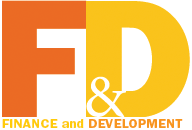Straight Talk:
The Poor Should Not Pay the Price for the Crisis
Finance & Development, December 2009, Volume 46, Number 4
The economic crisis forces us to confront chronic vulnerability and damaging inequality. How can the financial sector help shoulder the cost?

Dame Barbara Stocking
IN October 2009, a number of major banks reported notable recoveries from their financial woes, with a return to huge profits and “megabonuses.” Meanwhile, new figures show that the economic crisis is pushing 100 people a minute into poverty in developing countries.
This contrast not only illuminates a clear injustice, it also suggests important lessons for moving forward.
First, the severity and duration of the impact on the poorest highlight the extent of chronic vulnerability in the lives of many poor people in the developing world. Tackling this problem requires long-term solutions as well as an emergency response. Second, blind faith in deregulation and market fundamentalism has been shown to be folly. Finally, the stark comparison between the profits of those whose actions lie at the heart of the crisis and the poverty of those described by IMF Managing Director Dominique Strauss-Kahn as its “innocent victims” raises the question of what the financial world can do to pay for the damage inflicted.
Oxfam International works with local organizations in more than 100 countries, providing relief in times of disaster, partnering in long-term development programs, and supporting citizens’ groups to claim their rights and make their voices heard. Our work with the most vulnerable people gives us firsthand knowledge of the crisis and poverty, the progress already made, and the need for further coordinated action.
Impact at the margins
Clearly, there is no uniform picture of the effects of the crisis, which is anyway a compound of the high fuel prices, high food prices, and financial turmoil of the past two years. The impact in terms of investment, exports, jobs, remittances, aid flows, and government revenues is varied. But for Oxfam, a crucial aspect is that the impact—whether in the least developed countries or in dynamic emerging markets—is most catastrophic for those at the margins. People living at or under the poverty line, without a safety net, are the most vulnerable. This is especially true of women, who make up the majority of the world’s poor. Our research in several countries has found women to be most at risk of losing their livelihoods, whether they are garment workers in Cambodia or shea nut collectors in northern Ghana.
These vulnerable people are not only those who lose their jobs, but also their networks of dependents. In rural Cambodia, for example, 1.5 million people depend on remittances from migrant workers in urban areas—mostly women—as their major source of income. With fewer urban jobs, less money is sent home. It is estimated that up to one-third of workers in garment factories, construction, and tourism in Cambodia have lost their jobs since late 2008, resulting in a loss of $30–$45 million in remittances to rural areas.
Even when the crisis seems predominantly to affect the better-off, the impact can still be most severe for the very poor. It has been argued, for example, that the drop in international remittances to Ghana is most serious for the middle classes, who are more likely to receive them. But many of the poorest households in Ghana also get international remittances—and, when they do, depend on them for one-quarter of their income. In the first half of 2009, remittances shrank by $95 million compared with the same period in 2008. This phenomenon has been catastrophic for some of Ghana’s poorest families.
The human cost
What does this mean for people’s lives? As the poorest people struggle with even lower incomes, they are both cutting back on spending and seeking to supplement reduced earnings. But such coping strategies themselves often increase vulnerability. Oxfam research into the impact of the crisis on women has found many taking up second or even third jobs, or turning to informal work that is less secure, less physically safe, and comes without social protection.
An inescapable result of the crisis is an increase in hunger and malnutrition, particularly among children. This began with the rapid rise in food prices in 2007 and 2008; reduced household incomes are now perpetuating the problem even as food prices moderate slightly. An Oxfam study of crisis impacts found parents in the Philippines skipping meals so that their children could eat, and families in Cambodia most often coping by eating lower-quality food or fewer meals. World hunger is projected to reach a historic high in 2009, with just over one in six of the world’s population going hungry every day.
The ability to access services is also critically affected. Families are cutting spending on health and pulling children out of school to make ends meet, as shown, for example, in a 2008 Oxfam and Save the Children study of the impact of high food prices in the Sahel. Even in better times, the high cost of health care—felt most strongly by those with lower incomes—is one of the major drivers of poverty in developing countries. High health care costs and reduced incomes are a deadly combination.
Building resilience
This throws into sharper relief the need to increase investment both in meeting emergency needs now and in reducing vulnerability over the longer term through expanded social protection, health care, and education. Social protection programs have had an impressive impact in countries including India, Ethiopia, and Brazil, and civil society in Zambia and other countries is calling for similar initiatives. Moreover, if progress toward the UN Millennium Development Goals is not to be thrown into reverse, and countries’ development paths compromised by unhealthy and undereducated populations, there is a need for universal, equitable access to well-staffed health and education services. This must include, at a minimum, free primary education and health care—designed to work for women and girls as well as men and boys.
Some governments have made strong efforts to maintain and even increase social spending in response to the crisis. China is making record investments in public health services as part of its fiscal stimulus. In Latin America, most governments have introduced some kind of countercyclical policy to cushion the impact on poor people and maintain social spending. The IMF reports an increase in social spending in most low-income countries where it has programs.
It is crucial that these investments be more than a short-term stimulus that lasts only as long as the economic crisis at the global level. There is a need for long-term, sustained investment to reduce volatility in poor households’ incomes and build stronger, more accessible public services. The crisis has hit the poorest people in developing countries hardest, not because they are the most directly exposed to the financial markets in London or New York, but because their access to essential goods such as food, education, and health care is already fragile.
Paying the price
The question of financing inevitably arises. Oxfam is concerned with both what needs to be done and how it is paid for. We stand in solidarity with citizens who are calling on their governments to increase social investment. Present conditions make this more challenging: the World Bank estimates that the crisis has cut financing for health, education, social protection, and infrastructure in the 60 poorest countries by about $11.6 billion in 2009. The international community’s response should include a clampdown on the tax havens through which developing countries lose up to $500 billion a year, more support to expand progressive domestic tax collection, and the agreement of fair trade rules.
Development aid, while not a solution on its own, is also crucial. Oxfam is steadfast in demanding that donor governments meet their aid commitments. There is a clear need for more grants and concessional financing and for aid that is long term, predictable, and country owned, delivered as budget support wherever possible. Donor governments must deliver the resources promised.
The current crisis has helped highlight innovative sources of such financing, with finance ministers now seriously discussing the possibility of a tax on financial transactions. The immense volume of these transactions means that returns could be huge: projections indicate that a tax of just 5 basis points (0.05 percent) could raise as much as $700 billion dollars annually, even while limiting the most speculative trading. Introduction of such a tax is technically feasible, as has been underlined by economists such as Joseph Stiglitz. And it could be implemented in some jurisdictions and not others—such that, for instance, the euro area and the United Kingdom could go ahead even without the United States and Japan.
This idea also has increased political momentum in the current environment. In Pittsburgh in September 2009, the G-20 mandated the IMF to look into ways the financial sector could contribute to the cost of clearing up the crisis. We look forward to the launch of this study and to seeing a robust consideration of the options for a financial transaction tax. Ambitious action on this front by the world’s biggest economies could release huge sums, chipping away slightly at banks’ billion-dollar bonuses and profits to calm speculation and generate revenue that could strengthen the resilience of those most vulnerable to future crises.
Dame Barbara Stocking is Chief Executive of Oxfam Great Britain and a member of the Board of Oxfam International.


